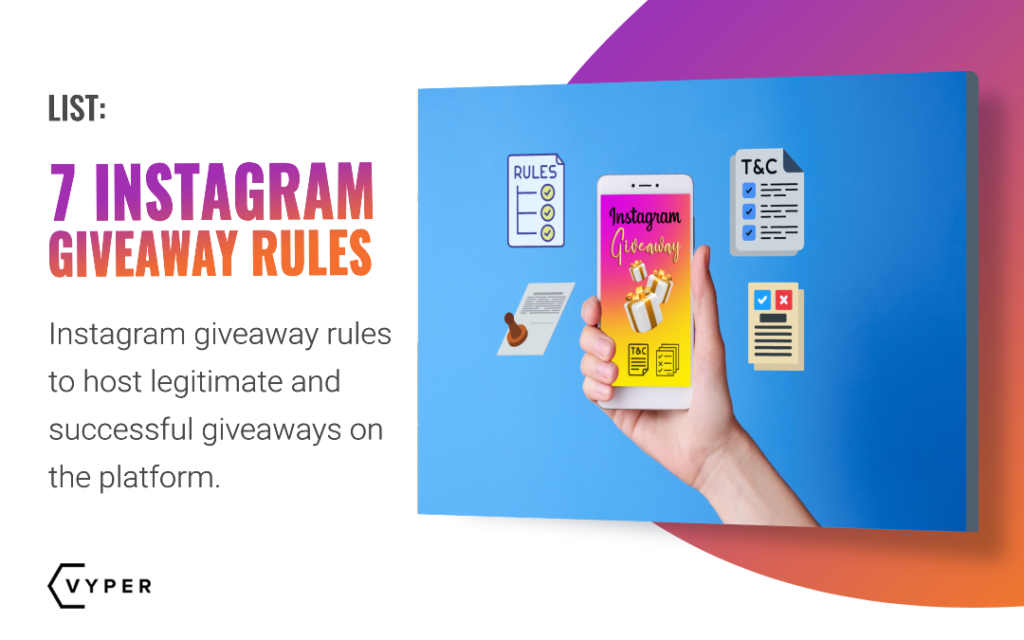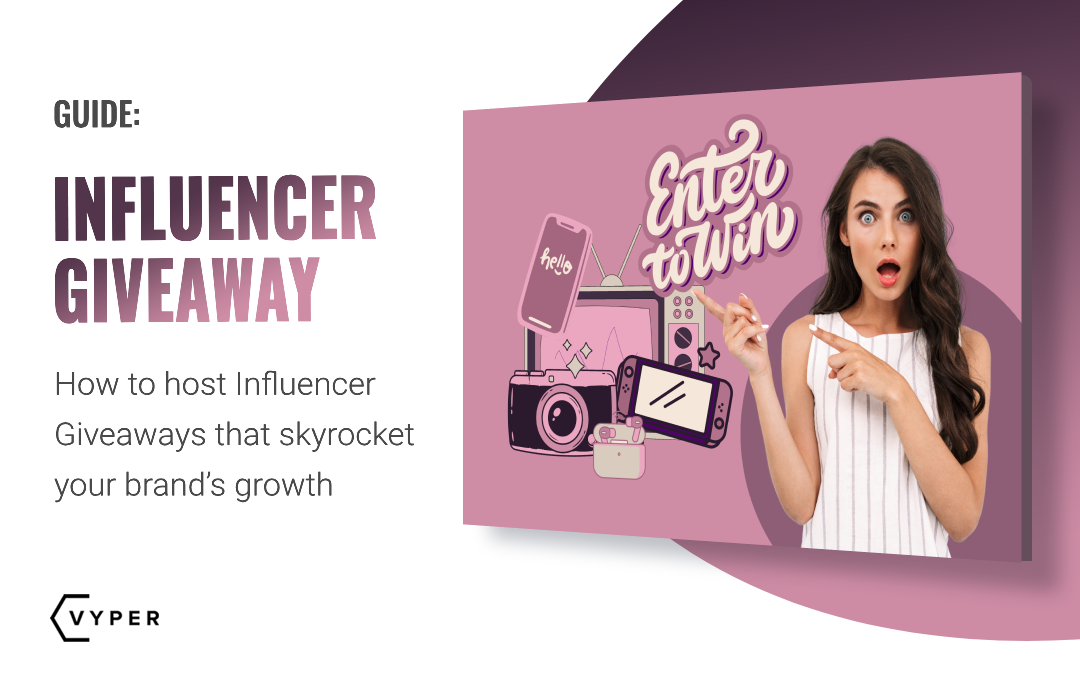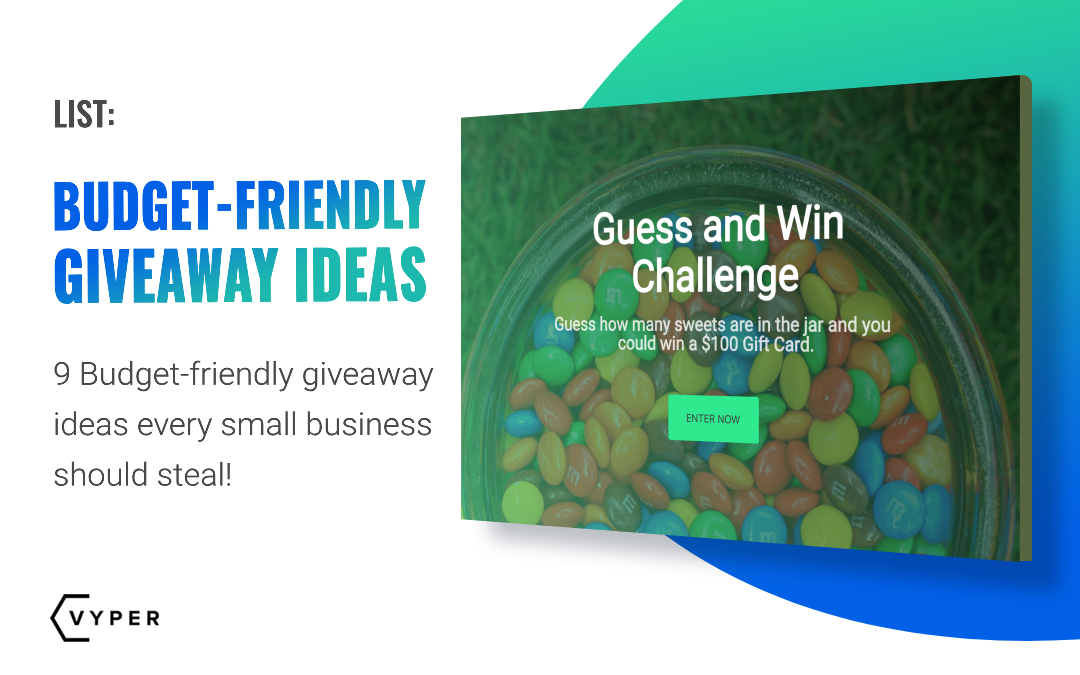Contests and giveaways are a sure-fire way to grow your brand, business, and audience efficiently.
Almost anything goes with a contest or giveaway as you can host them anywhere and choose a prize for your liking.
However, you will still have to be cautious when hosting them.
Your campaign has to comply with the law.
You can set the rules for your contest or giveaway, but you will still have to make sure that you are not going against the law.
This article has a quick overview of the most important legal requirements regarding contests and giveaways, which will help you get a better understanding of the law when you host your next campaign.

Types of Giveaways
You should always specify the type of promotion that you are hosting. If you are hosting a giveaway, then make it clear to participants that they are entering a giveaway.
If a person enters a giveaway, only to find out that they are now required to compete for the prize, it can potentially eliminate any trust you had with that person.
There can also be legal repercussions for not clearly stating the type of promotion you are running (or for falsely stating the promo type).
The most common types of promotions are:
- Sweepstakes
- Contests
- Lotteries
Sweepstakes
People enter sweepstakes so they can stand a chance at winning a prize. The winner of a sweepstake is, for the most part, chosen out of a lucky draw (or picked out at random).
There is no entry fee for sweepstakes, nor are people required to purchase something to enter.
The common (or most popular term) for sweepstakes is a giveaway. It’s common for brands to host giveaways because of its popularity on social networks.

If you are looking to host a giveaway of your own, it’s crucial that you Do Not charge people to enter.
You should host a giveaway that allows people to enter for free. There are various entry methods that you can use, which will be covered in more detail in this article.
Contest
People take part in contests to compete with one another with the hope of coming out first and winning a prize. In most cases, a winner is determined by their skill or effort made to reach the first place.
With a contest, people upload media such as a photo or video as an entry method. A winner is usually determined by skill or merit.

Unlike giveaways, contests do not work on chance. Contestants must apply their skills and expertise to be able to compete with other contestants.
Unlike giveaways, some contests will require users to make a purchase before they can enter. Starbucks famously held a ‘white cup contest’ that required users to doodle on an empty coffee cup that they purchased from the store.

Want to learn how to create your own viral Facebook contest?
Lottery
A lottery is a prize drawing that requires a purchase or payment to enter. In other words, people will have to buy a chance to win the prize.
Lotteries are considered to be highly regulated. Most private lotteries are illegal by state law.
Because lotteries have substantial cash prizes, there is room for fraudulent activities. Because of this, it is recommended that you don’t host your own lottery and use a giveaway or contest instead.
No Purchase Necessary Laws
When setting up your next campaign, you must ensure that you are not in violation of any No Purchase Necessary Laws.
These are laws that prevent brands from requesting a purchase or payment from users to enter the contest.
This also applies to other forms of consideration, such as monetary and non-monetary (time and effort put in by entrant that benefits the sponsor).
Examples include:
- Giveaway (sweepstakes) – A campaign in which the winners are picked at random. You are prohibited from requesting entrants to make a purchase.
- Contest – A campaign in which winners are picked based on merit and are also skill-based.
So, when hosting a giveaway, it’s crucial to set up a non-monetary entry method. You, as the sponsor, cannot benefit financially with every giveaway entry.

With a contest, you can ask for purchases or other forms of consideration. For example, a Facebook photo contest that requires all contestants to submit pictures of themselves using your product.
In this case, contestants will have to purchase your product so they can combine it with their skill to take part in your contest.


AMOE – Alternate Method of Entry
Sweepstakes in the US are required by law to have an Alternate Method of Entry (AMOE or Alternate Means of Entry).
If the sweepstakes do require a purchase to gain entry, then the rules must also list a ‘no purchase’ (AMOE) entry method.
Some of the most common AMOE is:
- Mail – In the past, people used to physically mail letters or entry forms to the brand’s PO Box address. Now, people can simply email their entries to an email address that is set up to receive entries for the promotion.
- Phone call and text – Another popular entry method from the past that is slowly phasing out. This method allows people to gain entry by phoning or texting the brand that’s hosting the promotion.
- Social media – This entry method allows users to gain entry by engaging with your brand on social media. It’s one of the most popular and efficient entry methods, which is why most brands prefer this method.
- Online entry forms – People can gain entry to a giveaway by completing an entry form on a website. It is crucial to have proper form validation to ensure that all required fields are correctly filled out.
- In-person entry – When people are allowed to submit their entry in-store or at an event.
It’s compulsory by law to include all alternate methods of entry in the rules of your sweepstakes.
Any user that uses alternate methods of entry to your sweepstakes must also have the same odds of winning as the rest of the entrants.

In the above giveaway, users can gain entry (and additional entries) for every person they tag in the post. The brand also clearly states ‘no purchase necessary’ in the post.
If you are unsure about setting up an alternate method of entries for your giveaway, then it’s best to simply run a promotion that does not require a purchase to enter. You can instead use other actions that are useful to you, like tag a friend in this post (from the example above) or visit our website.
FREE DOWNLOAD: Get all Our Contest & Giveaway Marketing Guides, Checklists, and tutorials that have helped 100’s of brands collect 15k+ emails in under 21 days!
The Importance of Having Official Contest Rules
It is essential for any giveaway to have its own set of ‘official rules”.
Having rules will ensure that your giveaway runs smoothly. Rules can protect you, and even your entrants should an issue arise during or after the giveaway.
It is also essential that the rules are easy to find and not difficult to understand.
Official rules for a giveaway can be made up of rules set by you. However, the rules you set must comply with both the guidelines of the platform you are hosting the giveaway on (e.g. Instagram) and the law of your country.
Social networks like Instagram state that they will not be liable if an issue or dispute occurs during or after your giveaway.

Because of this, you should not rely on the social network to intervene during any issues or disputes.
Your own official rules will assist you in decreasing the risk of liability.
It is also crucial that you make sure you follow the rules of the law. Setting rules that are considered illegal in your state can impact negatively on your brand.
For this reason, it is advised to consider legal advice when establishing rules for your contest (or when drawing up terms and conditions).
What Do You Include in Official Contest Rules?
When creating the official rules for a giveaway, you should try and include the following:
- Giveaway dates. This includes the opening date and closing date of the giveaway, as well as the date when winners will be chosen.
- A description of the prize, including its retail value.
- Determine how winners will be chosen.
- Determine how winners will be contacted. For example ‘winners will be contacted via email.
- The platform will be used to announce the winners. This can be your website, social media, or an email sent to all participants.
- Contact details of the brand hosting the giveaway. This includes a complete name and address.
- The location where the giveaway is being hosted. Also, determine who will be able to take part in the giveaway (e.g. a giveaway that is restricted only to U.S. residents).
- Minimum age required to enter the giveaway.
- Determine how a winner will receive their prize and when. If you plan on delivering the prize to the winner, then specify the estimated time of arrival.
- When hosting a giveaway on social media, always state that the giveaway is in no way sponsored by that social network.
VYPER has a terms and conditions generator which can populate some general rules for your campaign. This will help cover the basics.
First Step

Second Step

Third Step

Setting Up Rules for an Instagram Giveaway or Contest
Instagram giveaways are a fantastic way to grow your brand online and on social media. To host successful giveaways, planning ahead and establishing proper Instagram giveaway rules is crucial. Consider the following when setting rules for your Instagram Giveaway:
- Entry Method: Define clear rules for entering the giveaway. Options include filling out a form, tagging friends, downloading an app, or submitting a selfie.
- Prize Rules and Restrictions: Specify the prize and any limitations.
- Closing Date for Entries: Set a deadline for participation.
- Winner Selection: Explain how winners will be chosen.
- Claiming the Prize: Outline the process for claiming the prize.
- Terms and Conditions: Include any additional terms.
- Break Rules and Disqualification: Address consequences for rule violations.
Well-crafted giveaway rules can save your brand from embarrassment and ensure a smooth campaign. Happy hosting!

We have an in-depth guide on creating Instagram giveaway rules.
Click here for our Instagram Giveaway Rules guide.
Legal Contracts with Influencers
Kameron Monet is an Attorney who is passionate about creating content for her YouTube channels. Her content consists of lifestyle blogs and the legal side of influencer marketing.
We got a chance to talk to Kameron who has some excellent legal advice for influencers and brands. Watch the full interview below:
Q&A Contest Rules
No, you can not force someone to pay to enter a giveaway of sweepstakes as this would make your campaign a lottery that would be heavily regulated by state governments.
The laws around giveaways and contests differ according to state, country, or region. If you are unsure about the law regarding giveaways in your country, then it is best to seek legal advice first before you host a giveaway.
No, this will be in violation of the ‘No Purchase Necessary Law’ which restricts brands from requesting a purchase to gain entry. You can host a contest that requires people to purchase a product that will be used along with their skills to take part in the contest.
Giving people false hope in winning your giveaway when you already have a winner in mind can be considered as fraud in many states. While it might be challenging to prosecute a brand that hosted a fake giveaway, the idea that the winner was manually selected can damage the brand’s reputation.
It is reccomended that you use a tool like VYPER to randomly generate a winner.
TL;DR: Giveaway & Contest Rules
Contests and giveaways are fun and engaging campaigns that allow brands to grow their brand effectively. However, there are laws and regulations that you must abide by when hosting your campaign.
These are laws that are set by your country or state. You must research the laws and requirements around giveaways set by your territory before you start your next campaign.
NB. This post is meant to bring awareness to the laws regarding contests and giveaways. VYPER is not qualified to give legal advice regarding these laws. Its always recommended that you consult with a lawyer first before drafting out the rules of your contest or giveaway.
Jack Paxton is the co-founder of VYPER, a marketing tool that helps brands build email lists, social followings, and revenue using viral giveaways, referral, and reward programs. After millions of dollars spent testing different marketing strategies at his marketing agency. He then also co-founded Hyax a fast, conversion & design-focused course and funnel builder for creators.




Hey Stacy. Thank you for reaching out. You will have to request an official set of rules from the company that hosted the contest. Then see what the rules are regarding the voting process. Instagram also has their own set of rules regarding contests – https://help.instagram.com/179379842258600
If you can prove that the voting system was broken, then you can approach the company. However, you must understand that they will have to incur costs for re-doing the campaign and they must strip the prize from the 1st place winner. This will be a massive undertaking for them. So you will need a lot of evidence on your end to push them towards this.
It may not be worth your time and money to pursue this further legally as well as the costs incurred by your lawyer may not be worth the first place prize.
I recently participated in a baking contest hosted on Instagram by a prominent company. The challenge involved baking items according to provided recipes and sharing photographs of the finished products. While the prizes for 1st, 2nd, and 3rd place were clearly outlined, there were no detailed official rules beyond the statement from the company indicating that “VOTING begins on Instagram stories and YOU will decide who wins.”
The mechanism for the voting process was not explained, nor was it made clear how the company selected the finalists from the hundreds of submissions. Additionally, those chosen to participate in the final voting were not informed prior to the event. Voting was conducted through Instagram Stories, which limited participants’ ability to view the entries, given the brief duration and space constraints of the platform.
The voting mechanism displayed each baked good’s name, and by tapping on it, voters could cast their votes, which were supposed to reflect the current voting percentages in real time. However, there were significant issues with the voting box, including reports from many voters that their votes were not registered and that the vote percentages failed to update. Furthermore, the voting box obscured several photos, limiting voters’ ability to view the entries clearly, yet these complaints went unaddressed by the company.
Despite this, I ultimately achieved 2nd place based on the final vote count. However, the company has not responded to my inquiries regarding the winner’s list. Is there anything legally that I can do at this point? The company is based out of California.
You can do something similar to the Ridge Giveaway. Allow people to enter your giveaway for free. They must just submit email addresses or phone numbers to enter. Asking them to pay for a service to enter may not be legal. You can perhaps award bonus points or entries for every service they do with you.
I will need more info to properly answer. However, that user can be disqualified for cheating if the rules states this.
My company’s doing a giveaway and they’re giving away entries for submitting safety observations with a maximum of 2 per week. After 4 weeks one person has 21 tickets when you only could have had a maximum of 8. Is this illegal or a potential lawsuit?
I want to run a promotion at my dealership where if anyone comes into get service done to their vehicle they enter in a sweepstakes for a chance to win a free 1 year lease on a vehicle. Can I do that?
You can’t require people to make a purchase in a giveaway without registering the giveaway with the state. So if the giveaway is registered, then it may be legal for them to require a qualifying purchase.
I am wondering if this is legal:
A Qualifying Purchase(s) must be made during either Phase at any Participating Retailer(s). No AMOE option available.
Please let me know if there are any options I can take or just leave it alone.
The brand hosting the giveaway can make changes to the rules and AMOE. Especially if they have stipulated this in their Giveaway rules. If they did not, then you should approach them and ask them to issue a response. It is advisable to try and enter again via their new AMOE just to be safe and ensure you are still a part of the giveaway.
The brand hosting the giveaway may have the authority to change the AMOE. Especially if they have good reason to do so. It is for this reason that brands hosting a giveaway should include the fact that they may alter the AMOE when necessary in their giveaway Ts and Cs.
If there is no mention of change to AMOE in the giveaway rules, then you must take it up with the brand and let them respond accordingly.
Can a contest change the AMOE or Alternate Means of Entry rules mid way through the contest from AMOE Online Entry to AMOE Mail In entry? And if they can not do this what course of action should i take to remedy this.
Hi
I have been entering One Country contests https://onecountry.com/?utm_source=Klaviyo&utm_medium=email-flow&utm_campaign=Email%20%231&nb_klid=01EVEVQWNTACX8H5NYTMJH0CCC&_kx=FRMNnSM4QmgrShtfrjKX87t_eKJJ_Bd5WRCWvwEnT2o.QvScrt using the Alternate Free Alternate Method of Entry Email submission and today the rules have changed to Alternate Method of Entry Mail In Entry only midway through the contests, is there anything i can do or who do i complain to that they have changed entry method midway through the contests
Hi Matt. While your business idea/model may sound like a great idea, it may not be legal in many states or countries. For example, you cannot charge a customer for nothing. To rephrase, customers cannot pay your company money and receive nothing in return. You must deliver a service or product in exchange for a customer’s money.
With subscription services (Spotify, Netflix, etc.), customers pay to access content (music, movies). Spotify and Netflix both allow access to paid subscribers who then choose whether to use the service or not. These companies cannot charge customers a subscription and then choose which subscribers will have access at random.
Similarly if you charge a monthly subscription to people who wish to gain access to your giveaway group, that might have legal implications. Especially if your region has consumer protection laws in place.
I want start a monthly subscription say $9.99/Mo for example. The model behind this would be buying and practically just giving away merchandise for FREE either by our group on social media or via website. I don’t want to hold any contests, lotteries or sweepstakes.
IS THIS LEGAL? Or does it fall into one of those 3 categories?
Platforms like Facebook and Instagram (and most likely Whatnot) have spam filters that auto ban users and accounts when it detects “spam-like” behaviour. These platforms are especially strict regarding giveaways, as giveaways tend to attract a lot of bot activity. So even if you were not guilty of spamming, the system may suspect it and ban you.
We had a similar issue on Facebook and failed to resolve it as its near impossible to speak to an actual person when there is an issue. Everything on these platforms are automated so hard to ask a human to review your ban.
As for free shipping, I doubt your strategy is “illegal” as you are just trying to enter giveaways. However, if you are moving around the platform and entering too many giveaways only, then the platform may see you as potential spam and will try to stop you from further activity.
My wife and I have been using the whatnot app for about 6 months now. Recently they have banned us from giveaways for suspicious activity. I dont know what they mean. Yes we bounce around from stream to stream looking for giveaways. The new shipping requirements for purchases are over $8 even for something as small as 1 ounce so we use giveaways for reduced or free shipping. We usually try to buy when this happens. Is this legal? How can a platform like this be allowed to discriminate who can and can’t be allowed to enter. My adult son and daughter in law are also living with us currently and also getting blocked. When contacting whatnot, we only get an automated response but never a reason “suspicious activity “why they keep doing this. Is there a limit of giveaways that a person is allowed to enter on a platform like this?
Hey Jacob
Some influencers may request payment for shipping costs, including tax, if you are located in a different country.
They should specify this in the contest rules. It is also crucial that you be cautious when making such payments because of the number of recent scams that included influencers or scammers posing as influencers.
If you win a new iphone do you ha e to pay the influencer for tax and insurance before they send the phone to you?
It’s always best to check the law in your state or country before hosting a giveaway or sweepstakes. Some regions may not permit entrants that have a felony. If this is the case then you should perform a background check on the winner.
If your region allows it, then you can select your winner at random.
I entered a giveaway recently where every $10 I spent got me one entry. They just sent me a email saying I was getting a full refund and they are withdrawing the prize a Challenger hellcat can they legally do this?
Can a person with a felony win a sweepstakes contest